Children in War 75 years later
War pain does not fade
This documentary shows that War pain does not fade away. A documentary series with interviews with colorful Dutch celebrities who all experienced the war. Because they grew up in the war as children or were born just after the war and were confronted with parents who were severely traumatized. Like the parents of Adriaan van Dis (writer) and the mother of Jeroen Krabbé (actor and artist).
At first glance, these are all socially successful individuals. The Dutch audience also knows them this way. And with this success they entered living rooms as presenters, writers, actors, painters, ministers or mayors. All of them fascinating people with impressive careers and perhaps even more fascinating life stories.
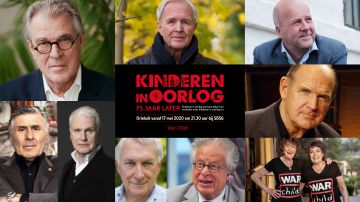
Participating in this documentary series were Jeroen Krabbé (actor and painter), Jan Terlouw (politician and writer), Diederik van Vleuten ( cabaret performer and presenter), Philip Freriks ( presenter), Hanneke Groenteman ( presenter and interviewer), Hedy D'ancona (politcus and writer), Ed van Thijn (politician, mayor of Amsterdam and writer), Koos Postema ( presenter), Adriaan van Dis (writer) and Sjaak Swart (soccer international).
Because what is much less known are the stories about the war that shaped their lives. Experiences and memories that they often did not talk about before because it was too painful or too confrontational. For example, did you know that Jeroen Krabbé, a nationally and internationally acclaimed actor, chose this profession because of the tragic story of his aunt Els? She was a member of the cabaret at Camp Westerbork and her transport was constantly being postponed. Until she had to go on the very last transport and was murdered in Auschwitz. Jeroen thought; "At least on stage I will be safe for a long time. As a child he had secretly read the postcards his aunt Els sent to her sister, Jeroen Krabbé's mother. On these postcards she wrote about the performances they gave in Camp Westerbork and how this was her rescue. It had to be done secretly because his mother never spoke about the war. 'But the sadness was there all the time,' said Jeroen Krabbé. Postcards and photos of his Aunt Els in this cabaret are present.
Or did you know that Adriaan van Dis (author) had already decided at the age of 6 to never become a father? Afraid to pass on his father's madness, uncontrolled rage, violence and insanity?
War is shaping them all
'The war has shaped me,' Jan Terlouw (author) says during his interview (age 88). In this documentary series, Dutch celebrities talk about how the war shaped them all. In impressive candid interviews they share their fears and how they each responded to them in their own way.
Jeroen Krabbé (actor) answers by, among other things, directing the very first Dutch play about Anne Frank and also playing the role of Otto Frank in it.
In it he wears his mother's Star of David. Together with Jip Wijngaarden (actress), this play became a great success. During the interview he talks about the realization of this play but that in the end it did not take away his fear. For that, he first had to go through a deep crisis during which he developed street anxiety and later painted nine man-sized paintings of his grandfather's demise. "That process washed him clean of my fears" - he says in the interview.
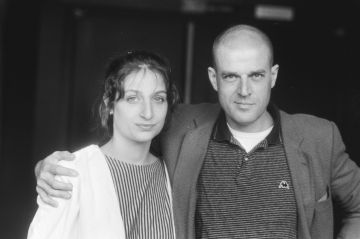
Jeroen Krabbé with lead actress Jip Wijngaarden for the play "Anne Frank.
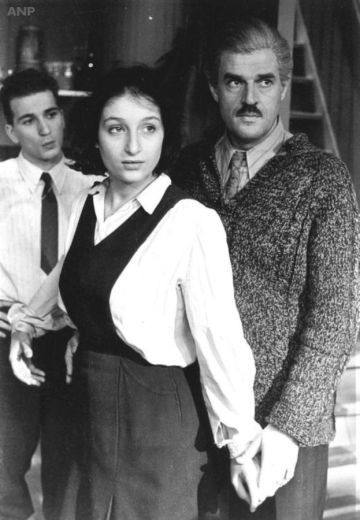
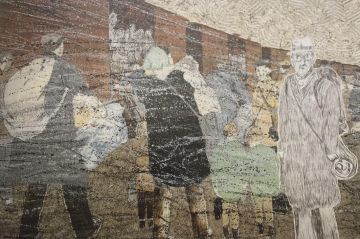
Ed van Thijn (politician, former mayor of Amsterdam, writer) also had all kinds of fears when, as a 10-year-old boy, he experienced the liberation in Camp Westerbork. His fears were prompted by the 18 different hiding addresses where he had been in which he was again betrayed at the last address and taken to prison. Where he was interrogated and provoked for two months for betraying his parents as a 10-year-old. But he kept telling the interrogators that his parents had died in the bombing of Rotterdam. After the war, he was reunited with his parents who could not deal with his fears and traumas and sent him to the psychiatrist where he received electroshock therapy. After that, he decided to remain silent about what he thought or what he felt.
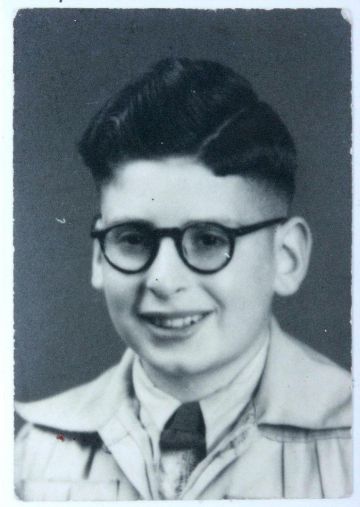
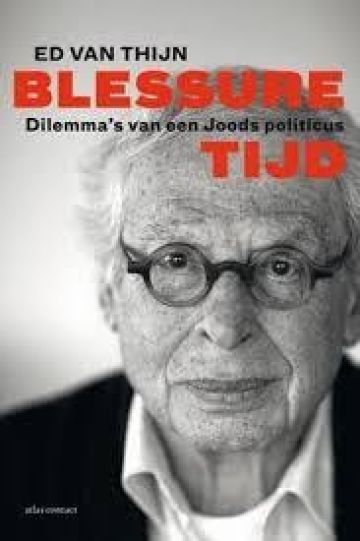
Break the Silence
Silence is something all these characters in this documentary are familiar with. They were eventually told to remain silent because it was too confrontational for those around them, or because they thought that by not speaking about it, the war experiences would disappear as if it had never happened. And precisely this silence by themselves but also by the adults around them ensures that the trauma remains present and needs to be covered up. Hanneke Groenteman (presenter, interviewer and writer) spent 4 years in hiding and was 6 years old when the war ended and she too was reunited with her parents. Hanneke wanted to ask her mother what it had been like for her to have to leave her daughter with strangers. To which her mother burst into tears and told her that it felt like she was letting her two-year-old daughter drown or throwing her out the window. She asked Hanneke never to ask about it again.
Above is a slideshow of photos from Hanneke Groenteman's private collection.
Hedy d'Ancona (politician and writer) was 8 years old when the war ended. She did not know then that her father and her sister had been killed in the death camps. After the war, they were never mentioned again. Something Hedy experienced as very damaging. Eventually, during a state visit as a minister in Jerusalem, she found the names of her father and her sister Myriam in the books containing the 106,000 names of all the murdered Jewish Dutch people.
Connecting with the war children of today
With the interviews they have now given, they want to break the silence. And not only break it but in doing so make an urgent call for the children who are now experiencing war not to remain silent. Because they know how destructive this is. War Child has developed scientifically proven methodologies to help children in war zones. That alone is why these people were willing to share their story to ask for support for War Child and with it support for the children they once were and for the children who are there now. Especially in the year in which the Netherlands celebrates its 75 Years of Peace and Freedom and in which peace must be cherished but also passed on. In each interview they bring up comparisons to today's war children and why we need to give these children help. The documentary will also feature footage from War Child at times like these.
Below you will find a brief overview where the career of the respective BN-er is and what war experience is opposite. You can click on the names to go to the different portraits.
Philip Johan Freriks
Philip Johan Freriks will be known to the general public as a newsreader at the NOS Journaal and host of De Slimste Mens. Besides being a presenter, he is also a journalist, columnist and author. He already worked as a journalist during high school and after his studies in Paris he worked there as a foreign correspondent for various newspapers and broadcasters. Once back in the Netherlands, Freriks presented several programs and, following the French example, initiated the Groot Dictee der Nederlandse Taal. He has been a columnist for NPO Radio 1 for some time and has appeared on stage with several shows. He is also an ambassador for book promotion campaign Nederland Leest and is himself the author of several books.
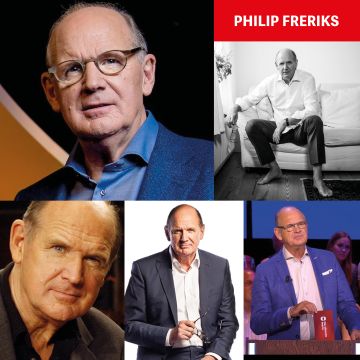
Philip Freriks his oldest brother is killed by a stray bullet at the liberation. Philip talks about this in the interview; "War has very far-reaching consequences, especially in our case. A family that experiences something like that never again looks at war as something exciting, or an adventure. It is so profound. The violence is so overwhelming. No human being can stand it. When something like that happens to you, as it happened to my parents and to me, you carry it with you for the rest of your life. That is something unbearable. My mother actually carried it with her until her death. In the first few years she could hardly go on living. That's something you experience as a child, of course. It marks your life. Also in a positive way of course, I hated war so much. You want to prevent that. That shocks me about society, people have forgotten what war can bring about. People sometimes talk about that easily. The worst thing is what you used to hear: 'A good war would shake things up.' Idiot. I know no soldier comes back from Uruzgan without damage. Then what about children, they didn't ask for it at all. I know what that means in the long run. A wound, that is pain. Something you carry with you all your life. I have sometimes compared it to a wound that starts to hurt with different weather conditions. You shouldn't exaggerate it, but it's there. It may be hard to explain how devastating it is, even mentally'.
Hanneke Groenteman
Hanneke Groenteman is well known as a journalist and presenter. She began her career at the Parool, initially in the type department, and later as a journalist. Later she made the switch to VARA where she started doing radio and, among other things, covered the riots surrounding the inauguration of Queen Beatrix. Later, Groenteman started working for television where, for example, she presented the program Sterren op het Doek for Omroep Max for 8 years. She is also a writer and has published 3 different books.
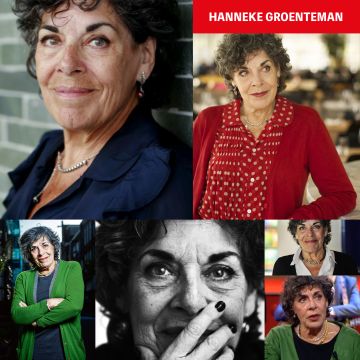
Hanneke Groetenman was 2.5 years old when her parents decided to send her to hiding. 'My mother was very scared, she did transfer that to me, so now I am too.' They got a call for the Holland Theatre to leave. My mother didn't trust that. As soon as the call came, my mother quickly arranged a hiding address for me, which was not so difficult for a child. Now that I have children and grandchildren of my own, I think back to that. I was 2.5 years old. I now think; "How did my mother get that over her heart to give me to strangers and not know if I would ever come back? The break-up was enormously painful but now I think; What courage and love to give your child!' Hanneke has never been able to talk to her parents about the period she spent in hiding until the age of 6. "Actually, I find it very sad that I was never able to do that. My parents survived, many others did not, that came up a lot in conversations. But when I once asked my mother what it was like for her to give me up she said; ' It was like I threw you out the window or let you drown!'. Later she said: 'Don't you ever ask that again! I have nightmares about it!’. So I actually never got to ask my parents what I had wanted. But why am I still crying about it? I'm 80 years old now... But you're still that child”.
Koos Postema
Koos Postema is a well-known Dutch television personality. After working for 5 years as a teacher for young employed people in Rotterdam, Postema began his media career at VARA radio. He later made the switch to television where, among other things, he presented the programs Een klein uur U and Een groot uur U, which discussed taboo-breaking topics such as abortion and transsexuality. The best-known program Postema presented was Klasgenoten, in which a Dutch celebrity was reunited with his or her old high school classmates. He has presented many other programs during his career and also played a small role in the Dutch feature film Het Bombardement.
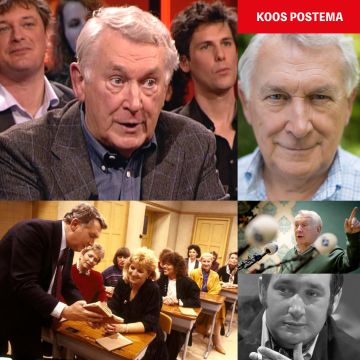
Koos Postema was 7 years old when the war began. He remembers the bombing of Rotterdam like yesterday; "We were eating a sandwich. My mother didn't eat and just sat looking around. Suddenly huge noise. I remember seeing them. Birds of steel and with that began the thundering of the bombs. That's unforgettable. That bombing is as if it happened yesterday '. He sees how the city is totally destroyed. The blow is so big! In 20 minutes you are no longer the same carefree little boy. Something essential has changed. That blow was and is there. There was an air alert. There were crying children. You saw that the city was on fire. You knew something was being destroyed that was yours. My brother was missing. He looked for us. He was not allowed to look for us but a few days later he was found on the outskirts of the city. Then we went to look in the city. There was nothing left at all. I had to go with him. My mother wouldn't let me go. It stank terribly in that city. People were piling up garbage. My mother found the street. I remember it exactly. There was a warped lamppost. Something was hanging from it on an iron wire, that was all. Stink and garbage. Terrible smell. Mother said; 'Come along, there's nothing left.' 'That was the 2nd blow, nothing more. No more toys. Everything gone, nothing! When you are 7 you think: 'There is nothing left that was mine. Only the clothes you are wearing'.
Jeroen Krabbé
Jeroen Krabbé is a well-known Dutch actor, director and painter. He began his training at the art academy and also did the Theater Academy in Amsterdam. As an actor, Krabbé starred in several films including Paul Verhoeven's two hit films Soldier of Orange and The Fourth Man. He also enjoyed success in Hollywood, where he was mostly cast as "The Bad Guy. For example, he played the bad guy in the James Bond film The Living Daylights and The Fugitive. As a director, Krabbé made his debut with a theatrical adaptation of Anne Frank's diary followed by many films including a film adaptation of Harry Mulisch's masterpiece The Discovery of Heaven. He is also a painter and specialized mainly in landscape works. In which no people appeared. 'People ruin paradise' was his argument. Later he did 9 paintings about the destruction of his mother's family.
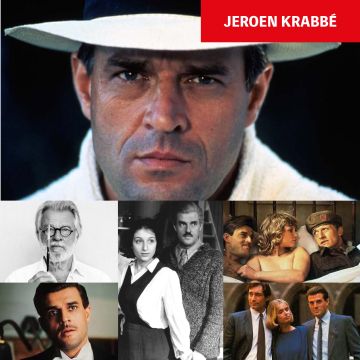
Jeroen Krabbé's mother is the only one in the family to survive the Holocaust. Something she never talked about. "As a sensitive little boy, I hardly dared to ask anything. There was a kind of transferred fear that is like a demon inside me. Because it's always with me. I did do something with that fear. I made two films; Left Luggage and the Discovery of Heaven. Also the theater production Anne Frank in which I wore my mother's Star of David. Still, that wasn't enough. At one point around the age of forty, I developed enormous fears and panic and no longer dared to go out on the street. I had a tremendous fear of death. I just sat at the window and couldn't do anything anymore. My wife then said; 'You really need to go look for help.' Which I then did. Then it became clear how my mother's silence made me so anxious. Eventually I heard the story through my aunt who survived the camp". Besides being an actor, Jeroen also became a painter where he had regular exhibitions. Paintings about paradise in which there were no people. "People ruin paradise. He called himself the painter of Happiness. Until he could no longer avoid it and ended up making 9 man-sized paintings about the downfall and murder of his grandfather. Up to and including the concentration camp where his grandfather and his aunt were poison gassed. During the interview, he talks about what happened to him during the realization of these paintings. He also talks about the Anne Frank play in which he played the lead role together with Jip Wijngaarden. During the preparation he had a lot of contact with Miep Gies. The woman who took care of the Frank family in the Secret Annex. She tells him how the day went when the Germans came to pick up Anne Frank and her family and what has happened to her since. Jeroen also tells about a movie set in a concentration camp where a trial was held against God and God was found guilty. Something he completely agrees with.
Hedy D'ancona
Hedy D'ancona is a well-known sociologist, politician and feminist. She began her career as a television producer for VARA. She then entered politics and was a member of the Senate on behalf of the Dutch Labour Party (PvdA). She became State Secretary for Social Affairs and Employment and also served in the European Parliament on behalf of the PvdA. She later became Minister for Welfare, Public Health and Culture before taking her seat again in the European Parliament. Hedy D'ancona is also one of the founders of feminist magazine Opzij and has been its editor-in-chief. She is also an ambassador for the B!INK foundation, which deals with the suffering of children in non-Western countries.
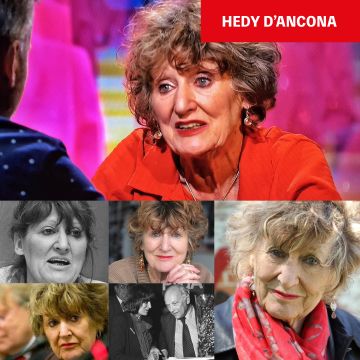
Hedy was 8 years old when peace came. At that time, she had no knowledge of the tragic fate of her father and her sister. Nor did she know yet that the love for her mother caused her father's death. After all, he was in America, safe. But he missed the woman with whom he was so in love and then returned. In a raid, he was arrested along with his daughter, who was not yet a year old! Both did not survive the war. After the war they are never spoken of again. Hedy says of this; "But when you are older the deafening silence breaks out. Because they think if there is no talking maybe it didn't really take place. It's bizarre and it's bad. People acted like it was a natural disaster, like there had been a terrible tsunami. All the adults covered themselves in silence. Only when I was much older was I able to unravel my parents' history. Even in high school it was never talked about. Children came from the East Indies, from the Japanese camps. Nobody talked about that. Horrifying, and also very bad. I'm sure those unanswered questions haunt you all your life. And also means that I had to live a double life. That I had to fill in something for someone else. It sounds exaggerated but when I see what I am involved in in my life, what is the real reason you do politics, at least that has been an important stimulus. Personally for me, I didn't start missing my father until after the war, I would have at least wanted to know who he had been so I could have identified myself'.
Jan Terlouw
Jan Terlouw is a well-known Dutch writer and former politician. He began his working life by first working 13 years as a nuclear physicist where he worked on fission of hydrogen because that would solve all energy and thus environmental problems. After 13 years he quit that and then started his political career by participating in Utrecht municipal politics on behalf of D66. Eventually he resigned from other work and decided to focus fully on politics, which resulted in a seat in the House of Representatives. He later became Minister of Economic Affairs and Deputy Prime Minister. Terlouw later quit politics but remained involved in political issues, such as the environment. Jan Terlouw is further known as the author of several books with the best known works being Oorlogswinter and Koning van Katoren. Both were awarded a Gouden Griffel. Both books have also been filmed and Oorlogswinter has played in international cinemas. Koning van Katoren was his first book which grew out of the stories he told his children to explain politics. Oorlogswinter followed a year later in 1972.
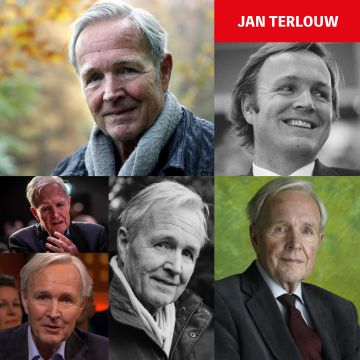
"The war made me who I am" said Jan Terlouw (88). Some books have eternal value. Oorlogswinter by Jan Terlouw is one of those. In it, he looks back on the Dutch Famine (Hunger Winter) in which, as a 13-year-old boy, he helped people who were stranded with their broken carts, looking for food. The desperation he found in these people and the meaning he could bring to them struck him deeply and he has never forgotten. It is not only these memories that shaped him but also the choices he saw people make in war situations. 'People were fearful and some respond to that with courage and others with cowardice. And what determines what choices you would make?" Questions he asked himself in this war and that helped shape him. Jan Terlouw tells a lot more about the war and his memories. How he had to hate the Germans but that it was difficult for him when two Germans soldiers came to live in their house. With one it was not at all difficult to hate him, but with the other.... who came from Bavaria, had a big belly and brought candy for the children and showed pictures of his children. Jan Terlouw did not manage to dislike him. He also gets emotional when he tells about his father who came bouncing down the garden path at the sight of the Canadians in their jeeps coming to liberate the Netherlands! Jan had never seen his father do that before. 'He was a pastor who mostly strode by.... How scared he must have been during the war!' You can keep listening to Jan Terlouw because he is a wonderful storyteller! About his frightened aunt but who ended up having people in hiding all the years of the war! He also tells how the book Oorlogswinter came about.
Ed van Thijn
Ed van Thijn is a well-known former politician for the Labour Party. After studying Politics and Social Sciences, he began his political career as a city councilor on behalf of the PvdA in the municipality of Amsterdam. He then became a member of the House of Representatives to eventually hold the post of Minister of the Interior. After serving as minister, Ed van Thijn returned to Amsterdam to serve as mayor for 11 years. He then served on behalf of the PvdA for a long period as a member of the Senate where his duties included being spokesman on foreign affairs. In addition to his political career, Van Thijn is also a writer and has published several books on politics and other subjects.
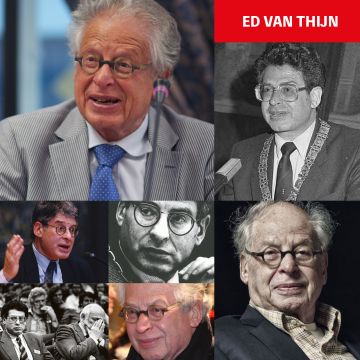
Ed Van Thijn is Jewish. After Westerbork he ended up at eighteen different hiding addresses. Addresses where he was repeatedly betrayed and as a result the Resistance had to regularly search for new hiding addresses. Because of the last betrayal, he ended up in prison as a 10-year-old for two months. There, his interrogators challenged him to betray his parents' location. Van Thijn remained strong. Systematically he answered that his parents had died in the bombing of Rotterdam. After two months of captivity, he was again sent to Camp Westerbork where he eventually managed to escape the last transport. After the war, he was reunited with his parents. His parents, who themselves suffered war trauma, did not know what to do with their 10-year-old son's trauma. They sent him to a psychiatrist who gave him electroshock therapy as a means of processing his traumas. Van Thijn then decided to remain silent about everything he had seen and experienced. Who would believe a child?
Now he is 85 years old and tells in the interview "that a number of years ago, from his many public functions he had, he was a speaker at many commemorations, but now he would no longer be able to do so because he would only cry...". His eyes are the proof.
Adriaan van Dis
Adriaan van Dis is a well-known Dutch author, journalist and television presenter. He was already an editor for the NRC Handelsblad during his studies and remained associated with the newspaper until long after his studies. He made his debut as a television presenter for the VPRO with the program Hier is ... Adriaan van Dis and later presented many more programs. He is also a well-known writer. His work includes novels, novellas, stories, essays, poetry and drama. One of his best-known works is the book De Indische Duinen. Adriaan has written many books about his family.
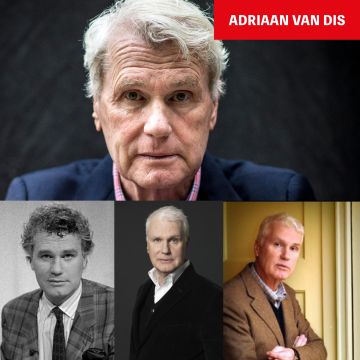
In Indonesia, Adriaan's mother and her three children were in a Japanese internment camp. Her first husband was beheaded. And Adriaan's father was also in several camps. Adriaan van Dis's father had a severe war trauma and came back from the war in the Dutch East Indies nervously ill. He is a cruel man with strange habits. He dies when Adriaan is 10 years old. As the years go by, Adriaan's hatred for his family grows. But also sensitive and afraid of the realization of being much like his father. Because not only in appearance, dark curls, the same face and voice.
But he also is similar to his father in terms of inner being. Quickly tempered, appearing indifferent and restless. The war has left not only physical but also mental injuries to his father. His aggressiveness, his counting mania, his incredible discipline and his weak health all have their origins in his war and camp experiences. In the interview he is asked the following question; Did you ever have a desire for children? No worse, I knew at age six that I would never, ever, ever get married and never have children. When I ran away from that insane family for the umpteenth time again. That food was thrown against the wall. In bed at 8:30 at Christmas. A father who went insane because we had to eat a rabbit we had been sent by the farmers that still had bullets in it. My father who then heard the bullets fall onto his plate. And went completely screaming mad at the sound of a bullet on the tableware. I was so afraid that his madness was in me that I knew I would never have children. That sounds very strange. No doubt that is projection, but I call that the oath I took at that moment. I walked out of the house, in Bergen aan Zee, into the dunes opposite the pine tree. There I stood looking, at that soft yellow light. That lamp up there. And all those insane ones at the table, I wouldn't belong there. Family, they fuck you up, your mom and dad. Adriaan says of his father; "He was an impossible, demanding man, who wanted to toughen me up and therefore chased me into the tallest trees, where I was then left dangling terrified from creaking branches; someone who came up with extremely laborious exercises with rulers and sticks, so as not to give my muscles a chance to process. After his death I was able to maintain for years that I hated the man, and that everything he stood for had nothing at all to do with my life." Adriaan undergoes a search for his family's past and for himself. As he unravels all the secrets about his family's past, he begins to understand his family and his father more and more, and his hatred and sarcasm diminishes. He even begins to show some genuine love for his family. In the documentary, he recounts what he has discovered.
Diederik van Vleuten
Diederik van Vleuten is a well-known Dutch musician and cabaret performer. He studied at the Conservatoire of Music in Amsterdam for two years before starting cabaret. Together with Eric van Muiswinkel and Justus van Oel he formed cabaret group Zak en As and later made theater programs with Eric van Muiswinkel. Van Vleuten has also participated in several television programs and also makes solo programs. As a composer, he makes music for television and radio programs.
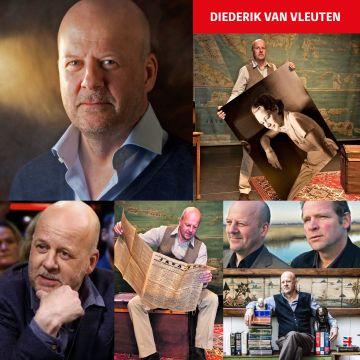
Diederik became famous in the cabaret duo with Erik van Muiswinkel. After Erik decided to quit, Diederik did not know what to do but fortunately his father gave him his uncle Jan's diaries about the Dutch East Indies . From which the performance arose 'Something great was done there'.
A theater performance that made the News because of its enormous success! It was as if he had touched an open nerve. People didn't really talk about the Dutch East Indies, or as little as possible. After all, it was ultimately a wrong war. In which the Netherlands initially talked about the police actions, it later turned out to have been a colonial war in which the Netherlands wanted to continue to rule Indonesia. Something they had been doing for more than three centuries. But the Indonesians no longer put up with this and revolted. The Netherlands wanted to control this rebellion and sent out and deployed the largest Dutch force ever. And eventually lost under pressure from the International Community who threatened to stop Marshall Aid if the Netherlands continued this colonial war. Diederik's family had been in the former Dutch East Indies for three generations. And the last generation was Uncle Jan's. He kept a diary because he was somewhere aware of the great events taking place. Diederik knows silence very well about this history but has been greatly helped by his Uncle Jan's diaries. He thinks that by having made it a theatrical performance that the traumas that came before, passed down for generations, were stopped by this performance. Precisely because it had to be kept quiet about it before. He says of this; "It wasn't talked about. And it's so easy to then say now, 'yes why not?' But I didn't experience it. I think you have to be in it to know it. If you know how difficult it is to talk about trauma, because it touches on yourself, your core and your deepest fears. If you have experienced something traumatic during a war, it largely determines the rest of the choices you make in your life! 'I don't do that because of fear', 'I don't do that because of.... 'I don't talk about that,' 'I don't do that, Or do I do...' These are all turn-offs in your life that have to do with that somewhere. And a war is such a big thing, that affects you".
Diederik experienced World War II from two sides. The Dutch East Indies through Uncle Jan's diaries and the war in the Netherlands through his parents who were teenagers during the war. His grandmother's father was someone with a high position in the Resistance. Something that was not talked about but of which she was a part. Because his mother was sometimes sent by her father, as a young girl, to the village and had to meet with someone she just had to pass on the message to; "The milk is boiling over . ". She knew she was part of something bigger. But throughout the war and also the time after, never knew what that "something" was. Until she dove into the archives.
